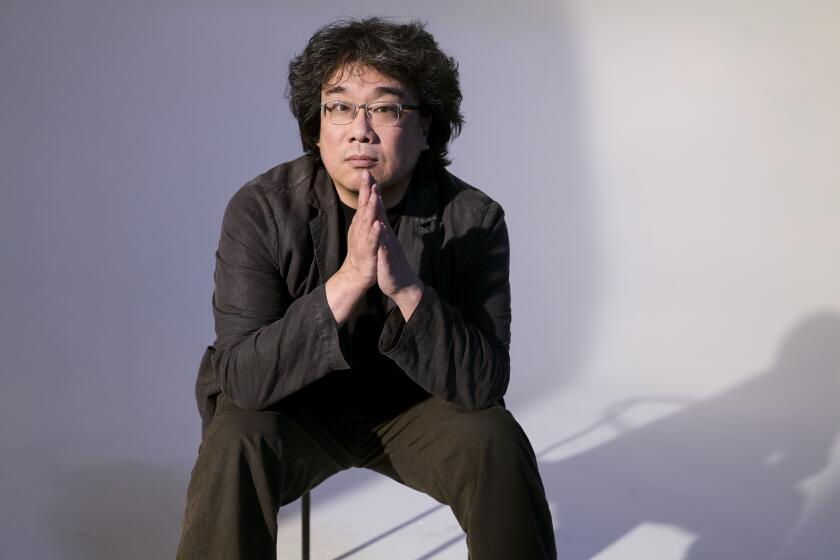Dean of ultimate party school
- Share via
WE’VE all been there. When rejected for something or other for one reason or another, it can suddenly seem as if the whole system, the world at large, has been designed for the single, soul-crushing purpose of stopping each of us dead in our tracks.
In the new comedy “Accepted,” young Bartelby Gaines (Justin Long) stares at such an emotional abyss after he is turned down by every college. He bands together with a handful of friends in a similar predicament to start a website for a made-up school -- the South Harmon Institute of Technology -- to appease their parents. Soon other kids just start showing up, and a school that offers such curriculum as “Rock Our Faces Off” and “Taking a Walk and Thinking About Stuff” is up and running.
The film, which opens Friday, is the feature directing debut for Steve Pink. With a resume that includes numerous theatrical productions (including directing Jeremy Piven in the American premiere of Lou Stein’s adaptation of “Fear and Loathing in Las Vegas”) and a few years as a Chicago social worker, Pink’s main movie credits are as a co-writer on two vehicles for his high school buddy John Cusack, “Grosse Pointe Blank” and “High Fidelity.”
Both films were unexpectedly engaging and perceptive, prefiguring the recent spate of thirty-something “how did I get here” movies.
Pink brought that same sharp and warm sensibility to the “where am I going” story of “Accepted,” helping turn what might have been a run-of-the-mill youth programmer into something with a little more up its sleeve. An ode to doing your own thing, “Accepted” in a different era might even have been tagged as anti-establishment.
Though he had other projects he was attached to as a writer-director, Pink put himself up for directing “Accepted,” credited to writers Adam Cooper, Bill Collage and Mark Perez. Even now, he seems surprised to have gotten the job, as he notes, “I just kept interviewing, and they just kept calling me back.”
Although Pink had spent time on film sets as a writer and producer, he had only shot a few minutes of film footage for multimedia theatrical presentations. He had confidence in his way with the actors, however, more specifically in his ability to encourage them to improvise and more fully inhabit their characters.
“For me, the greatest joy in creating something has always been in just making sure it’s good,” he says, “more than caring whether the actors say a certain line or express it a certain way. I’m open to the good. I have a very low threshold for boredom, and I have a really sensitive nose for what I think is bad.”
With Tom Shadyac, whose own directing credits include the hit “Bruce Almighty,” on set as producer, Pink always had someone around to guide him as necessary. Before shooting began, he called up “High Fidelity” director Stephen Frears for a little pep talk and some words of wisdom.
“He was really generous with his ideas, and he had very simple advice, which was just see if you’re enjoying what you’re doing. Look at what you’re shooting and make it better if you can. It seems obvious, but it really helped.”
Though “Grosse Pointe Blank” and “High Fidelity” were about people basically his own age, allowing him to check his own emotional gauges to guide the characters, for “Accepted,” Pink had to call on recollections of his younger self. He also found a great resource in the de facto focus group of cast and extras on set every day.
“There’s a certain universality to being a cynical teenager, but in terms of the expression of young people, I let them do that. I relied on them. I was surrounded by people 18 to 25, and I was just listening to them. What is their experience of the world? Where’s the comedy in that, where’s the struggle?
“In the other two movies, I was absolutely invested in the story ideas, in comparing them to my actual life. In this case, I relied on them to express it and then I would focus on the things that were interesting or funny or seemed true.”
THE trailers and TV spots for the film prominently feature a gag in which actor Jonah Hill seems to let loose with a wailing, high-pitched scream. (The clip is also on the film’s website.) As Pink explains, the actual scream came from the mouth of co-star Maria Thayer, and he says this moment of free-wheeling camaraderie and creativity captures “in a nutshell” the way he marshaled the set.
“There was actually a big fight when we recorded the DVD commentary as to who thought of it. My official story is Jonah thought of it, but he had a sore throat. Justin says, ‘Have someone else scream,’ and then Maria says, ‘I have a great horror movie scream.’ Then they worked out the timing while I set up the shot.”
He playfully adds, “This is what I remember distinctly, regardless of what the others want to take credit for.”
Part of what makes the world of “Accepted” seem fresh is its reliance on quirky new faces in a variety of small sidekick roles. Unknown performers such as Adam Herschman as the flaky layabout who wants to be a chef or Joe Hursley as the beer deliveryman who wants to be a lead singer are given uncommon room to show their stuff.
“For as many archetypes-slash-stereotypes as there are in this movie,” says Pink, “I think there are a lot of original characters that replace the stereotypes. I tried to imagine what story they each might bring. When you have a fake college, who would go there?”
More to Read
Only good movies
Get the Indie Focus newsletter, Mark Olsen's weekly guide to the world of cinema.
You may occasionally receive promotional content from the Los Angeles Times.











